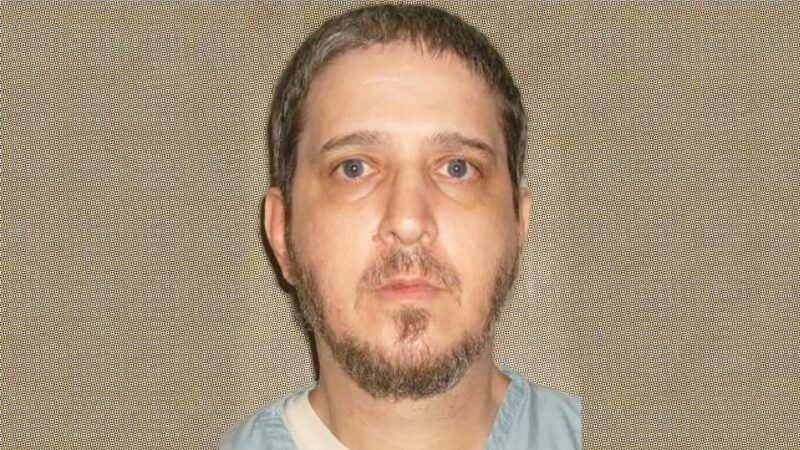Oklahoma Court Denies New Evidence Hearing for Death Row Inmate Richard Glossip
After the latest reprieve from the governor, he’s scheduled for execution in February.

Oklahoma's criminal appeals court has denied a motion by death row prisoner Richard Glossip for a new evidentiary hearing to consider the possibility that he's innocent of murder and shouldn't be executed.
Glossip has been on death row for most of the past 24 years, having been convicted in 1998 for orchestrating the murder of Oklahoma City hotel owner Barry Van Treese. Glossip was never accused of directly killing Van Treese. He was convicted of convincing Justin Sneed (who was 19 at the time), the maintenance man of the hotel where Glossip was the manager, to do the deed, with Glossip saying they would split Van Treese's money.
Glossip has maintained his innocence. Sneed's testimony has served as the primary evidence against Glossip. Sneed himself was sentenced to life in prison, and Glossip's lawyers have argued that detectives investigating the case essentially fed Sneed the story to blame Glossip to deflect full responsibility.
Though Glossip was first convicted in 1998, the Oklahoma Court of Criminal Appeals tossed out his conviction due to the poor evidence and he was retried. He was nevertheless convicted again in 2004.
The lack of much evidence outside of Sneed's testimony has lent a lot of credibility to claims of Glossip's innocence, and in the past year, a pack of bipartisan lawmakers (several of whom support the death penalty) have been calling for another review of the evidence. Bolstering Glossip's claims was a report from law firm Reed Smith detailing many problems with the case. In August they unearthed what appears to be a 2007 letter from Sneed to Gina K. Walker, who was his public defender, suggesting that he was rethinking his testimony, calling it a "mistake," and asking to meet with her.
Subsequently, Gov. Kevin Stitt ordered a two-month stay of Glossip's execution, which had been scheduled for Sept. 22, for his innocence to be considered. On Nov. 3, Stitt granted a second two-month stay as the legal proceedings continued. He is now scheduled for execution on Feb. 16, 2023.
But today's ruling puts a damper on those efforts and also serves to show how heavily the deck is stacked against defendants once they've been sentenced to death. Glossip's motion makes several claims of procedural and due process issues, none of which the court will consider, Judge David Lewis explains, because Oklahoma's Post-Conviction Procedure Act puts strict time limits on when these claims can be made.
The court can still consider claims of factual innocence, and Glossip did claim as such in this motion. Unfortunately the Criminal Court of Appeals did not find that Glossip had provided enough proof of his own innocence to call for a new hearing. Now that Glossip has been convicted by a jury, the onus fall on him to provide evidence that he's innocent. Oklahoma law requires that Glossip show by "clear and convincing evidence" (a legal standard showing a "high probability" that the claim is true) that he's innocent. David notes in the denial that "[The court's judges] weigh any evidence presented against the evidence as a whole, in a light most favorable to the State, to determine if Glossip has met his burden."
The judges note the various jailhouse informants who have provided affidavits claiming to have heard Sneed admit killing Van Treese in order to rob him while never mentioning Glossip and evidence that Sneed was a drug user with a "violent personality." But none of that clears Glossip. Davis writes, "Contrary to Glossip's assertion, there is no evidence that Sneed has ever sought to recant his testimony in any meaningful way. Further, none of the other witnesses against Glossip have changed their story."
In other words, the judges don't see a difference between the evidence used to convict Glossip in the first place and the evidence they're looking at now. But because Glossip has already been convicted, even if the evidence seems very thin now, the judges need Glossip to prove more than that it's highly likely that Sneed is lying. And mind you, all these hurdles are just to open a new evidentiary hearing, not to throw out the conviction.
"This is a very difficult decision to understand," said Don Knight, Glossip's attorney, in a written statement. "The evidence of Rich's innocence, and the State's misconduct, is overwhelming and deserving of, at the very minimum, a fair hearing where we can present our evidence. This is all we have ever asked for and is something that, obviously, the State is desperate to see never happen."
Glossip has a second petition for relief submitted to the same court, alleging prosecutorial misconduct and again mentioning Sneed's past interest in possibly recanting. Glossip has had his execution delayed six times now. But the clock is ticking again. In June, Oklahoma's attorney general asked the state to start scheduling executions of 25 inmates, Glossip just one among them. The state has executed four prisoners this year and has two more scheduled before the end of 2022.


Show Comments (36)